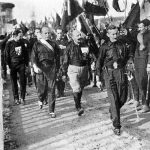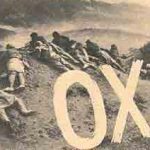 1922 – Italian fascists, led by Benito Mussolini, march on Rome and dominate the Italian government. This march was a mass organized demonstration which was organized by Benito Mussolini’s National Fascist Party. When fascist troops entered Rome, Prime Minister Luigi Facta wanted to declare a state of siege, but this was rejected by King Victor Emmanuel III. The next day, on October 29, 1922, the King appointed Mussolini as Prime Minister, thus transferring political power to the fascists without an armed conflict.
1922 – Italian fascists, led by Benito Mussolini, march on Rome and dominate the Italian government. This march was a mass organized demonstration which was organized by Benito Mussolini’s National Fascist Party. When fascist troops entered Rome, Prime Minister Luigi Facta wanted to declare a state of siege, but this was rejected by King Victor Emmanuel III. The next day, on October 29, 1922, the King appointed Mussolini as Prime Minister, thus transferring political power to the fascists without an armed conflict.
 1940 – Prime Minister Ioannis Metaxas rejects the famous Italian ultimatum in Greece. Also known as “Day of No”, this moment symbolizes the beginning of the Italo-Greek War, which for the most part took place in southern Albania. The Greek government rejected with an unequivocal, Italian note, which provided for the abandonment of some military bases on Greek soil, Mussolini’s troops. For this reason, fascist Italy launched the frontal attack on the Greek army. After thwarting this attack, Italy asked Germany for help, and the latter invaded all of Greece.
1940 – Prime Minister Ioannis Metaxas rejects the famous Italian ultimatum in Greece. Also known as “Day of No”, this moment symbolizes the beginning of the Italo-Greek War, which for the most part took place in southern Albania. The Greek government rejected with an unequivocal, Italian note, which provided for the abandonment of some military bases on Greek soil, Mussolini’s troops. For this reason, fascist Italy launched the frontal attack on the Greek army. After thwarting this attack, Italy asked Germany for help, and the latter invaded all of Greece.
 1955 – Born in Seattle, one of the world’s richest businessmen, Microsoft founder Bill Gates. Gates is internationally known as, business tycoon, investor, and philanthropist. During his career at Microsoft, Gates held the positions of President, CEO and Chief Architect of Software, while also being the largest individual shareholder until May 2014. According to Forbes economic magazine, Bill Gates is the second most valuable person. rich in the world, with a fortune of $ 906 billion.
1955 – Born in Seattle, one of the world’s richest businessmen, Microsoft founder Bill Gates. Gates is internationally known as, business tycoon, investor, and philanthropist. During his career at Microsoft, Gates held the positions of President, CEO and Chief Architect of Software, while also being the largest individual shareholder until May 2014. According to Forbes economic magazine, Bill Gates is the second most valuable person. rich in the world, with a fortune of $ 906 billion.
 1959 – Extinction at age 27, No. 3 of Cuban revolutionaries after Castro and Che Guevara, Camilo Cienfuegos. Cienfuegos, was a Cuban revolutionary born in Havana. Along with Fidel Castro, Che Guevara, Juan Almeida Bosque and Raúl Castro, he was a member of the 1956 Granma expedition, which launched Fidel Castro’s armed uprising against the government of Cuban dictator Fulgencio Batista. He became one of Castro’s top guerrilla commanders, known as the “Hero of Yaguajay” after winning a major battle of the Cuban Revolution. His death on the Cessna 310 private jet off the Caribbean coast has remained a mystery to this day.
1959 – Extinction at age 27, No. 3 of Cuban revolutionaries after Castro and Che Guevara, Camilo Cienfuegos. Cienfuegos, was a Cuban revolutionary born in Havana. Along with Fidel Castro, Che Guevara, Juan Almeida Bosque and Raúl Castro, he was a member of the 1956 Granma expedition, which launched Fidel Castro’s armed uprising against the government of Cuban dictator Fulgencio Batista. He became one of Castro’s top guerrilla commanders, known as the “Hero of Yaguajay” after winning a major battle of the Cuban Revolution. His death on the Cessna 310 private jet off the Caribbean coast has remained a mystery to this day.
 1982 – For the first time in nearly half a century, Spain organizes free and fair, pluralistic parliamentary elections. After the fall of the dictatorship of Francisco Franco, the King of Spain Juan Carlos would decree free elections. The General Elections of Spain in 1982 were held to elect, the second part of the General Council, of the Kingdom of Spain. All 350 seats in the House of Representatives were ready for election, as well as 208 of the 254 seats in the Senate. The election was won by Felipe Gonzales’s Socialist Party.
1982 – For the first time in nearly half a century, Spain organizes free and fair, pluralistic parliamentary elections. After the fall of the dictatorship of Francisco Franco, the King of Spain Juan Carlos would decree free elections. The General Elections of Spain in 1982 were held to elect, the second part of the General Council, of the Kingdom of Spain. All 350 seats in the House of Representatives were ready for election, as well as 208 of the 254 seats in the Senate. The election was won by Felipe Gonzales’s Socialist Party.
 1995 – A national tragedy occurs in Baku, Azerbaijan. A fire broke out in the metro system in Baku, between Ulduz and Nariman Narimanov stations. According to official figures, 289 people were killed, 286 passengers (including 28 children) and three rescue workers, while 270 people were injured. The fire was estimated to have been caused by electrical malfunction, but the possibility of deliberate sabotage was not ruled out. Although a large number of people who evacuated the train survived, the fire remains the deadliest subway disaster in the world. The firefighter, Chingiz Babayev, was posthumously awarded the title of National Hero of Azerbaijan for the lives of the passengers.
1995 – A national tragedy occurs in Baku, Azerbaijan. A fire broke out in the metro system in Baku, between Ulduz and Nariman Narimanov stations. According to official figures, 289 people were killed, 286 passengers (including 28 children) and three rescue workers, while 270 people were injured. The fire was estimated to have been caused by electrical malfunction, but the possibility of deliberate sabotage was not ruled out. Although a large number of people who evacuated the train survived, the fire remains the deadliest subway disaster in the world. The firefighter, Chingiz Babayev, was posthumously awarded the title of National Hero of Azerbaijan for the lives of the passengers.
 2007 – In Argentina, Cristina Fernández de Kirchner is elected President of this country. Fernandez is the first woman to serve as President of Argentina, the first directly elected female President and the first woman to be re-elected to office. Ideologically a Peronist, she was a member of the Justistic Party, with her political approach being characterized as Kirchnerism. She would lead Argentina, for 8 years, undertaking substantial economic and social policies, to pull the country out of the economic crisis, and from the inflation that had plagued it.
2007 – In Argentina, Cristina Fernández de Kirchner is elected President of this country. Fernandez is the first woman to serve as President of Argentina, the first directly elected female President and the first woman to be re-elected to office. Ideologically a Peronist, she was a member of the Justistic Party, with her political approach being characterized as Kirchnerism. She would lead Argentina, for 8 years, undertaking substantial economic and social policies, to pull the country out of the economic crisis, and from the inflation that had plagued it.






